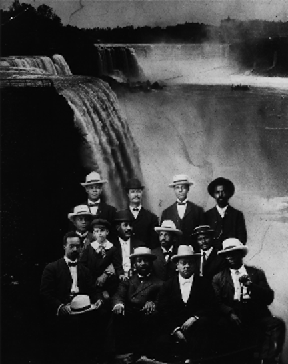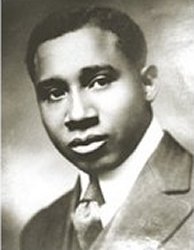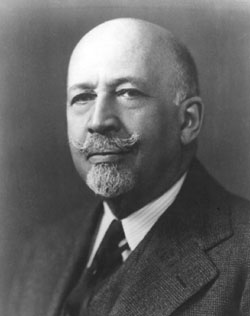An interview with Founder and Artistic Director Brainerd Blyden-Taylor
| AND God stepped out into space, And He looked around and said, “I’m lonely— And far as the eye of God could see Then God smiled, And the darkness rolled up on one side, And God said, “That’s good!” - James Weldon Johnson |

The Niagara Movement Conference (1905) |
Placing a particularly joyful emphasis on the "Then God smiled", from the above poem, which he recited verbatim before me, by James Weldon Johnson (1871–1938), Toronto-based Nathaniel Dett Choir''s founder and artistic director Brainerd Blyden-Taylor makes the point that "Afrocentric" inspiration can speak to anyone's soul. "Come on now ... That’s beautiful poetry, it’s beautiful imagery, and it’s black imagery,” he goes on to say. Blyden-Taylor refers to a white musical colleague of his who felt inspired by Johnson's above poem to compose a musical adaptation. "She’s white, but she’s been informed, she’s been altered, and she’s been influenced by something of the African heritage experience. For me, that’s Afrocentric too," explains Brainerd Blyden-Taylor. Such was his well-thought-out response to my question, on that chilly wintery evening in Toronto, about how his use of the term "Afrocentric music" was received given the multicultural nature of his choir's ensemble cast. As he takes out, from his well-nourished library, a copy of Molefi Kete Asante''s book Afrocentricity: The Theory of Social Change, I can tell he is more than well prepared to tackle the skeptics.
|
Brainerd Blyden-Taylor |
“I don’t use the term Afrocentric to describe my singers," as he is careful to point out. "When I started to use the term eight years ago, it felt right to me. I hadn’t even seen this (Asante) book yet."
When he founded the Nathaniel Dett Chorale eight years ago, Blyden-Taylor was looking for a term which, "would speak to the breadth and nature of the music" he wanted to do. "I didn’t want to say I’m starting a chamber choir that’s dedicated to doing music from black composers. And I could have. But I felt that this was a little limiting." He refers, in particular, to the work of a non-black composer, George Gershwin, whose music the chorale has interpreted. "Some may say, well, he’s not a black composer. But so much of Gershwin’s music is Afrocentric! How else could you describe it? The man steeped himself in the black experience." For instance, Blyden-Taylor points out that Gershwin travelled to the U.S. deep south to find inspiration for Porgy and Bess. |
Founded on February 24th, 1998, the Nathaniel Dett Chorale is currently in its seventh season. Why the name Nathaniel Dett for the ensemble? Brainerd Blyden-Taylor recalls feeling like he wanted to pay tribute to a black Canadian musician.
Born in Drummondville (now Niagara Falls), Ontario, on October 11th, 1882, Nathaniel Dett was a gifted composer, pianist, organ player, poet and educator. "We talk about ethnomusicologists. People who would go out and collect folk material and arrange it or expand it. He did that. He did that with the spirituals," to quote Blyden-Taylor.
| Particularly inspiring about Nathaniel Dett's character, as Brainerd Blyden-Taylor recounts for AfroToronto.com, was his steadfast refusal to be treated as a second-class citizen. When his ensemble was asked to perform in segregated theatres, he would not allow himself or his choir to enter by the backdoor. "You invited us to come here and to perform for your audience. We’ll come through the front door, or perhaps you are not that interested in our performance."
Wherever he went, his resolve remained steadfast. When returning from a glorious musical tour of seven European countries, during the 1930s, Dett and his choir had gained such notoriety that, despite returning to America with his chorale in third-class accommodation aboard a steamship (because that is all they could afford), they were asked to perform for the first class quarters' passengers. Dett said he would do it under one condition. That all the passengers from all the quarters are allowed to attend the performance. I read that, and I just said: “I love this man. I respect this man. I appreciate this man," says Blyden-Taylor. |

Nathaniel Dett |
By naming his chorale after Nathaniel Dett, Brainerd Blyden-Taylor felt: "I would be honouring the legacy of this tremendous individual. And I would be honoured at the same time with black history, Canadian history, musical history and just the legacy of a huge human being. Even though he wasn’t that tall. So I feel proud to name my ensemble after him."
But the Nathaniel Dett Chorale does not only play Nathaniel Dett's compositions. Their mandate is to provide a wider variety of musical or choral repertoire. Headed by Blyden-Taylor's decades of experience as a musical director at various Anglican churches, university and high school choirs, and international guest conductor invitations to the U.S., Portugal, and Israel, the Nathaniel Dett Choir comprises a varied and accomplished group of singers and musicians who are all classically trained.
This week, at the George Weston Recital Hall in Toronto, the Nathaniel Dett Choir presents a multi-disciplinary show entitled The Niagara Movement. Originally staged last year by Virginia's Hampton University choir in Niagara Falls, New York, the event's purpose was to commemorate the first significant black-organized protest movement of the twentieth century. In 1905, W.E.B. DuBois put together an all-black group of activists on the Canadian side of Niagara Falls in order to bring their minds together and become a collective catalyst to force social change. Quoting Brainerd Blyden-Taylor: "Men and women came together to have a conversation about how blacks should go about going after what was rightfully theirs as humans and as individuals." So they had their first conference on these ideas from July 11th to July 14th 1905. As W.E.B. DuBois said in his own words: “We call it the Niagara Movement in part for the place that we first gathered and in part using the falls as a symbol for the torrent of awareness and consciousness that we wanted to unleash in America."

W.E.B. DuBois (1868-1963) |

Booker T. Washington (1856-1915) |
The Niagara Movement concert actually juxtaposes the dialogue, or the debate, which happened between two black men who really were icons of their day. Those men were the aforementioned W.E.B. DuBois and Booker T. Washington. While W.E.B. DuBois sought to promote a much more vigorous approach to black emancipation, Booker T. Washington promoted a decisively more accommodating stance. A very famous speech given by Booker T. Washington in Atlanta in 1895 was dubbed "The Compromise Speech." As Blyden-Taylor explains: "his (Washington) speech was embraced by both the industrialists in the north and the plantation owners in the south. And on the one hand, W.E.B. DuBois responded by congratulating him on getting national attention but then again, on the other hand, turned around and criticized him for his views as being too accommodating." DuBois was a proponent of a more assertive manner in putting civil rights out there to be recognized. This created sort of a life-long debate. But it became evident later in Booker T. Washington''s life that his genuine views were much closer to those of DuBois than previously thought.
Two exceptional Toronto actors take on the roles of W.E.B. DuBois and Booker T. Washington on Wednesday night's performance. David Collins, a Dora-nominated actor, who was most recently featured in Pusha-man (Theatre Passe Muraille) and The Taming of the Shrew, will be joined by Dora-winner actor Andrew Moodie who wrote and directed The Real McCoy (currently playing at Factory Theatre) to portray this epic debate. The Nathaniel Dett Chorale will be sharing the stage with the actors as the performance artfully weaves between acting performances, soulful singing and arresting visual presentations.
Runs: Feb 22, 2006
At: George Weston Recital Hall, Toronto Centre for the Arts, 5040 Yonge Street, Toronto
Playing: Wednesday
Times: 8 pm
Cost: $29.00, $33.50, $39.50
For more information:
visit www.nathanieldettchorale.org
Phone: 416-872-1111
or visit www.ticketmaster.ca






Comments powered by CComment